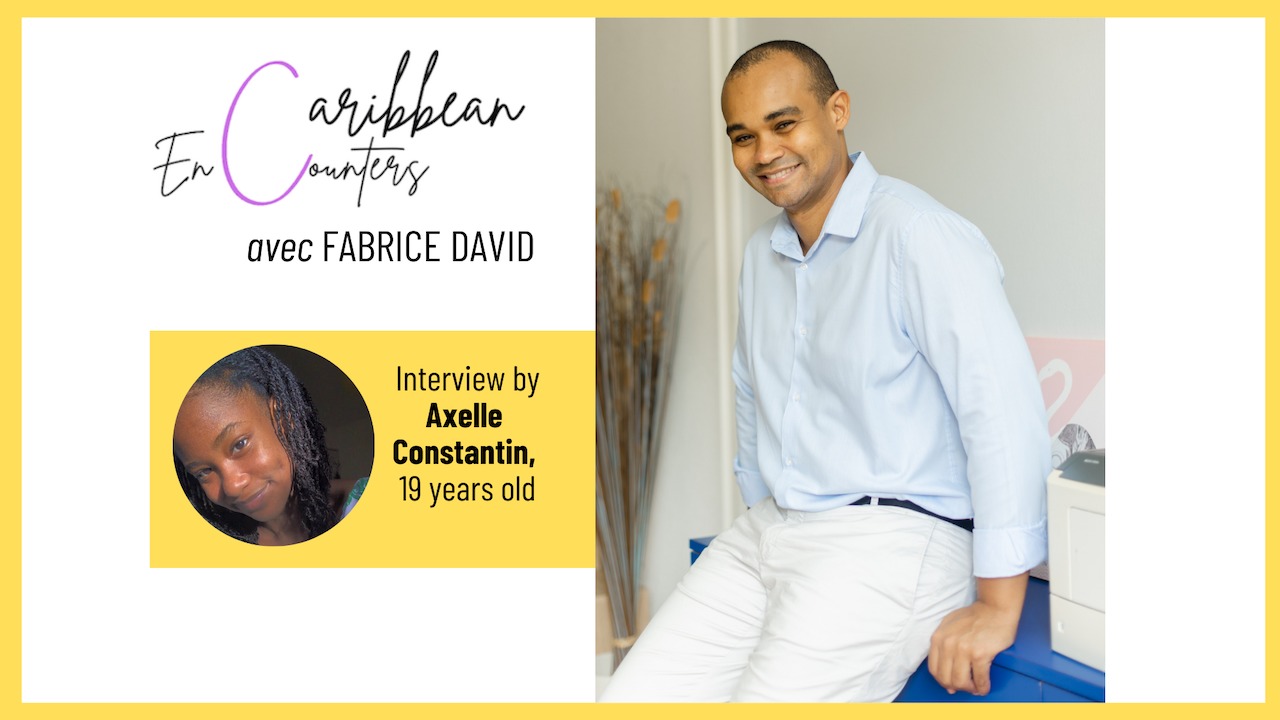What a pleasure to be back to work for Le blog de Mylène Colmar! After the interview series at the end of 2020, I promised myself to continue to exchange with great personalities, inspiring profiles to further enrich my Caribbean Encounters.
This time, I got Fabrice David to say yes! Although we knew each other before, I had never taken the time to talk with him extensively. That’s why he is the first one to reopen the interviews after almost a one-year break.
By the end of our exchange, I was excited to start writing. You’ll understand why!
« Okay… and should I introduce myself now? »
This is what he says when I ask him about himself. Just with that question, I know for sure that the rest of the interview I’m going to laugh! And I’m not wrong.
Of Guadeloupean origin, he grew up between Les Abymes and Le Gosier.
After spending time in Martinique and England for studies, he came back to Guadeloupe to settle down. His work will later lead him to discover French Guyana, Saint-Martin and Nantes. Today he is a real estate agent.
He identifies as a native Guadeloupean with African influences from his father born in Central Africa.
« My father was born in Central Africa but his parents were Guadeloupean. My grandfather had left to work there. So they learned the culture there. My father’s parents were Guadeloupean, so with regular vacations to Guadeloupe the connection has always existed. »
His father brings with him and the rest of his family (mother, sisters…) an influence that can be found in interior design and interest in art.
» The transmission of influences is dual in my home. »
On the one hand there is the Afrodescendence from the Caribbean peoples’ history , and on the other hand a transmission directly from his father.
Yassa chicken, Senegalese rice, Thieb, and many other dishes were already familiar to him before he even set foot in Africa.
He even admits that he knows a few words of some African dialects. Perhaps one day he will teach me a word or two!
F.W.I.
In between a couple of words, the discussion continues. As West Indians, it is common to hear clichés and stereotypes from non-West Indians. But are they all inaccurate? I ask Fabrice.
« Nou ka ri fó1 ». The proof is, we laugh about it. « And then we stamp our feet. »
It’s true, when you’re near a West Indian laughing, you can hardly help but laugh too, it’s contagious!
I am even more curious to know what Fabrice thinks is the most beautiful thing about our culture.
« I find that the most beautiful thing is the truth within us. »
This sentence makes me raise my eyebrows. I wouldn’t have thought of that answer, I must admit. « This truth that translates into language, into the love that we give to our children, this truth that we find in our food… when a mother or an auntie comes home to cook in her kitchen, it’s not a 15-minute thing and then like ba’y lè2 ! And most importantly, manjé manjé ay! This truth that makes us us with all the particularities that it brings, I find it very valuable. There is always something real that comes out of a West Indian even if they attempt to cover it up. That it is in the body, the language, the moment when the Creole will intervene while speaking in French. Even if they try to hide it, the truth, it’s going to come out one way or another. We’re real. »
(How I couldn’t wait to write that!).
For Fabrice, truth gets lost so much these days, that it’s important for us to cultivate it. It is proof that there is humanity in us.
Continuing along the same lines, we talk about Creole. He tells me that, learning Creole in school is an excellent idea because it is so omnipresent, and it is interesting to give it an official legitimacy when taught to students because there are always remains of the mentality that speaking Creole is not always considered appropriate.
Teaching Creole in school reexamines the idea that Creole is a language in its own right and that it has its own place to take, whether it’s in the playground, at the dinner table with parents or at work.
» Every language has its registers. » He goes on to argue that Creole varies depending on who you are speaking to and the context. « Learning this language in a classroom will legitimize the existence of the language in all places, and will allow many people to be themselves even more. »
As we talk about our traditions, I ask him if there is one that he would like to see remain or disappear.
» Carnival! » he quickly answers. « In my opinion it should be our first business activity in Guadeloupe, and given the extended time period (we have nearly three months of carnival), it should be the top priority during touristic season! The culture is in the music, the costumes, the songs, the history, the fun, the dancing, the art, the sewing (the food)… it is all in the carnival. And then the truth of the people! ».
He explains to me how people adjust their schedules to prepare for carnival, and admits that he wishes the event had been more open. « For me carnival is really about how the street belong to the people. » There needs to be more of an inclusivity, and not just organized groups and spectators.” He would like to see more involvement from the actual people, for everyone to express themselves as they wish without necessarily being in a group. « If we miss the very purpose of the carnival, which is for me that the street belongs to the people, we’ll get lost in the midst of it. »
Over-organization could drain the freedom of expression that carnival brings. It can exist but without hiding the existence of free self-expression of people.
« For me the carnival is a releasing device, where we pull back the curtain of various social obligations, and we let go. Well, basically, I like it. »
It is on this same lightheartedness that we continue the interview.
Fun
What West Indian dish would you be and why?
« When is the interview coming out? Because it may influence my answer… » he asks me as my question puts him in a difficult position. He even has trouble choosing between sweet and salty dishes.
After a few bursts of laughter, and a short hesitation, he tells me about a root vegetable dish (« it’s lighter and tastes better than rice » he says), fish court-bouillon (because he loves fresh fish) with some red beans (because he loves that too).
Dominos or belote?
« You’re giving me a hard time because I don’t play any of these. »
He chooses belote anyway for the mere reason that it’s the game he played the most compared to dominoes, which rarely entertained him except when he was in Martinique. He adds, « The Martinican domino … they only play with three people, folks get on the table to make the other people loose… » … and we chuckle again.
A underrated zouk song?
« Ola ou ay chèché sé kestyon la sa hein?replies. « There are so many of them… It’s a difficult question because I’m a zouk fan, and the consumer society means that nowadays, a song comes out but you forget about it quickly, not because you don’t like the song but because you move on quickly. »
He took a long time to think about it, but I couldn’t wait for him to share a piece of his musical bubble with me. He introduced me to « Movetan » by Marie-José Gibon, a retro zouk song he particularly appreciates.
Bokit or agoulou?
Without any hesitation, he declares: « bokit ».
The lighter paste of bokits makes all the difference for him. « Bokits don’t make me feel like it’s junk food. As a matter of fact my stomach is fine with its digestion. I don’t eat it often, though. But you won’t make me eat an agoulou. Awa. Sa ka maré lestonmak aw.4 There is no compatibility between agoulou and my stomach. »
And we laugh even more!
Sorbet or sinobol?
He chose the sorbet again without hesitation. It was a no-brainer.
What is THE thing to do when you arrive in Guadeloupe?
If we come back to Guadeloupe, the first thing to do is to go and eat at mom’s, grandma’s, auntie’s…it’s the essential step according to Fabrice. We must go and eat a good home-made meal.
For tourists, it would be to go spend some time at the beach.
We approached so many subjects in forty-five minutes!
From food, to clichés, to culture, to language, to origins, a multitude of aspects of our truths as West Indians were covered through our words and laughter. It was a moment that was not only enriching, but also entertaining and took me around the Caribbean (with a little detour to Africa) without even having to step outside.
1: « We laugh loudly. »
2: means « don’t bother her ».
3: « Where did you get these questions, huh?
4: « No. It knots your stomach. »




